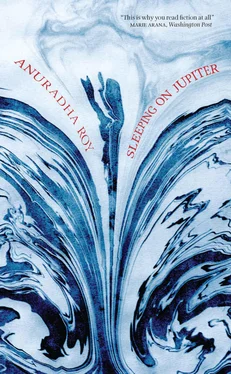*
The Sun Temple’s parking lot was a square of baking grey cement patrolled by a sun-shrivelled attendant who stopped giving Suraj meaningful looks after his first few glances at the packet of cigarettes went unacknowledged. The excitable clamour of tourists and guides was no more than a distant murmur here. Suraj perched on a low wall shaded by the bulk of a four-wheel drive. He counted the dents on the car, speculating about their causes. The owners must be slobs: the car was dirty both inside and out, muddy and scratched. His own car, when he could buy something that wasn’t a dinky Korean toy, would gleam, it would smell of leather. He would never smoke inside it. He had always wanted a four-wheel drive — a real, heavy, roaring Jeep whose top could be rolled away so you could drive with the wind in your face. He would drive to Ladakh in that Jeep, right from Bangalore, taking a month, maybe more, wandering coasts and forests along the way, foraging for food in wayside dhabas, picking up hitchhikers, letting them go, stopping when tired, then carrying on, filming the journey.
If he had told her about it, Ayesha would have called it another of his schemes to run away from life — as if life were something that you had to grit your teeth against and endure. She said he was an escape artist — when all he wanted was the freedom to just be, to come and go without a hundred accusatory questions from strident wives and anxious mothers. He lied to them both for no reason at all sometimes, merely to feel himself free. Why shouldn’t he tell his mother he was in Hyderabad when in fact he was in Jarmuli?
It struck him that he should call Nomi. He had left her so suddenly up there on the way to the tallest tower, shooting off like a bullet the minute he sighted Latika Aunty holding hands with a stranger. Maybe Nomi hadn’t heard him when he told her he would wait for her in the car. What if she thought he was going to come back to the ruins for her? He slid his hand into his pocket for his phone.
It wasn’t there. Of course. It had been stolen on the beach that morning.
He got up from his wall and found his driver chatting nearby in a knot of other waiting drivers. He borrowed the man’s phone — then was stumped trying to recall Nomi’s number. He had never needed to memorise it.
He retreated to the warm shade of their hired car and sat inside it, sweating, wondering if he should go back and find her — but if he went back he would very likely bump into his mother and her friends. He decided to wait. He fidgeted, drank some water, smoked a cigarette. He thought he would stretch out on the car seat and take a nap, but it was full of things. He stowed away a tube of Nomi’s sunscreen and bottles of water. One of the many elastic bands she used for her hair lay on the seat too. It had a plastic daisy on it. He slipped it round his wrist like a bangle to give her later.
Then his hands fell on her computer. She had left her laptop in the car. He sat tapping the lid, listening to his nail on its surface, a metallic sound. It had a sleek body, slim and light. He had never seen one of these machines, they had just come out. He opened the lid. He shut it again. Should he go on?
What if she happened to arrive just then and saw him? She would be furious he was snooping. But he wanted to snoop. He had to know: where had she disappeared to that morning when she abandoned him at the Vishnu temple? And then yesterday, when he thought they would go together to clear a few permissions to shoot, she had made an excuse and not come back till the evening, when she came up with that cock and bull story of going to see a sculptor.
He opened the laptop’s lid again. There was the lit screen — she hadn’t even shut the machine down and he had to tap no password to access the files. Really, people as careless as her deserved what was coming to them. His fingers revelled in the familiar pleasure of trackpad and keys. He navigated her machine swiftly and surely. He was good with computers, it took him seconds to find his way around new ones. He opened her photo application and found it empty. That was odd. He had never come across people who didn’t store pictures on their machines. He started up her e-mail programme — it wasn’t configured. That meant she used e-mail off the internet, but since there was no connection here, he wouldn’t be able to see what she did on the net.
He began searching her folders. Quite a lot of notes and writing — he couldn’t linger too much on those — she might come back. There was a folder named after him. He paused over that, but it contained only copies of his own e-mails to her.
The door of the car clicked open and Suraj slammed the laptop shut, his mind racing to find explanations to give. “I was hunting for your phone number,” he would say. That was the most plausible.
But it wasn’t Nomi. It was the driver. “We should go,” the driver said. “It’s getting late, we have a long way to go and it’ll get dark. We can’t wait any more. There are buses from here also — she must have gone back to Jarmuli on one of those.”
Suraj agreed with the driver — she must have misunderstood and taken a bus. Why else was she taking so long? The car slid out from its slot in the parking lot, the air conditioner came back on, and its first cool currents made Suraj sigh with relief. He opened the laptop, this time with no sense of urgency or stealth. He tapped the trackpad.
*
Latika seemed to be in the grip of a curious exhilaration for hours after her visit to the ruins at the Sun Temple. She swatted away Vidya’s questions about Suraj. “You know how confused Gouri is about faces! She thought she saw him, but it was someone else entirely. Who was it, Gouri?” She insisted she would sit in the front seat on the way back because she had felt squashed between Vidya and Gouri during the drive from the hotel. She ignored Vidya’s troubled glances and chattered on, even with the driver who was really the hotel’s manager. He was no longer the taciturn man who had driven them out, and Vidya caught snatches of their conversation from the back, the two of them sounding as comfortable as old friends. At times they heard Latika humming “Are you lonesome tonight” in her husky voice which an admirer had once described as sand and smoke. When they stopped midway to look at a confluence of river and sea, Latika walked into the mirror-still water, unconcerned about wetting clothes and sandals. She would not come out of there until Vidya said, “Really, Latika, be reasonable, it’s getting dark.”
The rest of the drive down the highway was suffused with a sense of things ending. Vidya was already tense about her electricity bill. She was sure it had come by now and if the bill wasn’t paid on time she might lose her connection. And then? In a few minutes her mind felt as if it were an undone skein of wool: impossible to find the beginning or end of the problem of the unpaid bill. The car speeded down the last of the twilit roads and secretive trees. “At day’s end, like the hush of dew comes evening,” Gouri murmured to herself. “The kite wipes the scent of sunlight from its wings.” She could not remember the next few lines or where she had read the poem. Perhaps at college. After a moment some snatches came back to her and she whispered, “All birds come home, all rivers, all of life’s tasks finished, only darkness remains.” Looking out of the window she said sadly, “It’s over so soon.” They were approaching street lights, cars, buildings, Jarmuli’s market.
“It’s not! Let’s get off at the bazaar! I don’t feel like the hotel yet.” Latika twisted herself back to look at them. “Come on now, you two, let’s have some fun.”
“Aren’t you tired?” Vidya said. “We can go tomorrow. We were there just yesterday.” The sense of misgiving which had taken root in her after hearing that Gouri had caught sight of her son weighed her down, and tired her out. First her ill health, then that molten sun pouring down on her head all afternoon, then Suraj. She tried reminding herself of the many times Gouri had confused one person with another. But the same thought went around her brain in concentric circles that tightened into an aching noose. Why had her son followed her to Jarmuli? Did he need to speak to her about something? But then they had spoken the morning she left, when she had phoned him. Had she imagined his unease, his attempt to hang up minutes after she called? He had been sounding evasive and abrupt for many months — one had to be grateful he answered his phone at all, which was more than she could say of her daughter-in-law, Ayesha.
Читать дальше












